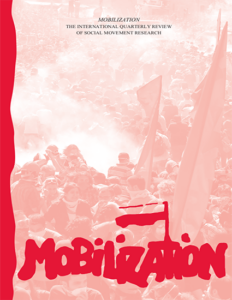
Ho Ming-sho
in Mobilization: An International Journal, 25 (SI): 711-728
Abstract: This article analyzes the Hong Kong’s 2019 anti-extradition movement and how it learned from the unsuccessful lessons of the 2014 umbrella movement. Existing theories, such as protest cycles, spillover, and abeyance provide inadequate explanations of the linkage between these two movements. This article contends that collective learning from the previous setbacks enabled Hong Kong’s protesters to launch a more challenging protest five years later. Such learning was made possible because (1) the occupation zones of the umbrella movement served as an incubator for new and experimental tactics that were later deployed, (2) post-occupy organizations sustained a network of participants scattered across different professions that emerged as the mobilizing infrastructure, and (3) in order to avoid the same mistakes, participants recognized the need for more decentralized decision making and tolerance for radical protests.
About the author: Ho Ming-sho was a HYI Visiting Scholar from 2018-19.
